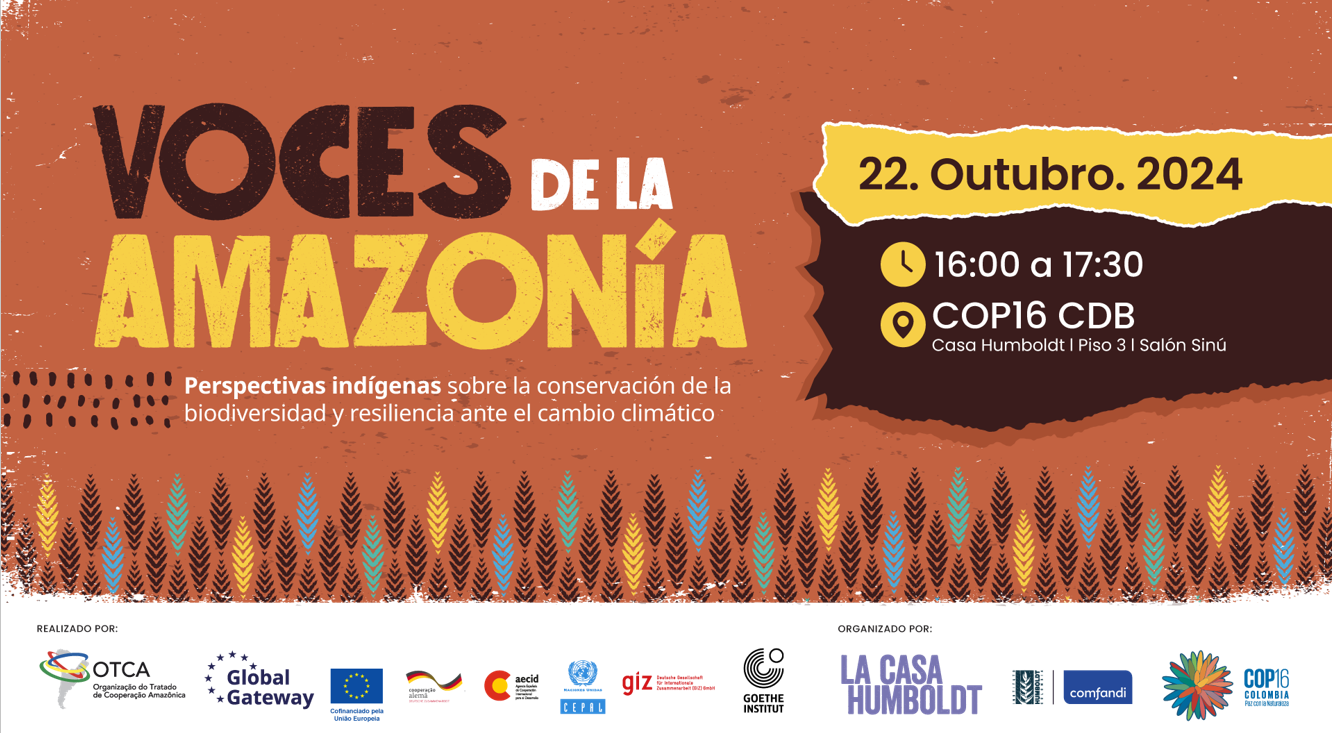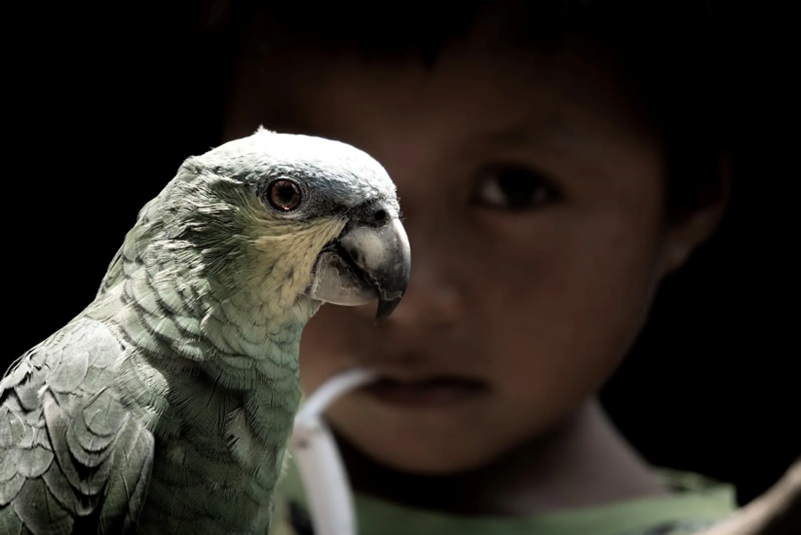18 de October de 2024
Cultural initiative highlights indigenous female leadership in the debate on reconciliation with the planet.

The event is free, will feature short films produced in indigenous territories, and will promote a roundtable discussion with prominent voices in indigenous female art and activism.
On October 23, Euroclima, OTCA (Amazon Cooperation Treaty Organization), and the Goethe-Institut São Paulo are promoting a cultural initiative, with the free screening of three short films produced in indigenous territories. The event, which starts at 6:30 PM, will also include a roundtable discussion with the participation of renowned voices in indigenous female art and activism: Beka Munduruku and Cristine Takuá. In addition, we will have the presence of Mari Corrêa, founder of the Indigenous Women’s Audiovisual Network – Katahirine, and the discussion will be moderated by journalist Nádia Pontes from Deutsche Welle (DW) Brazil.
“Paths to Reconciliation with the Planet” aims to highlight the role of indigenous peoples in building new possibilities for coexistence between humans and the natural world. The proposal is to showcase the contributions of these women – whether in politics, cinema, visual arts, activism, or other fields – and how their leaderships balance gender equity with ecological preservation.
Although Brazil is home to more than 305 indigenous peoples, the vast ancestral wisdom and deep meanings of being indigenous still do not receive adequate recognition. In light of this, this initiative proposes to reflect on fundamental questions such as: How much of this knowledge is valued? How do indigenous peoples connect with the forest? How can we coexist more harmoniously in today’s world? What can we learn from the indigenous worldview?
To answer these questions, it is essential that indigenous narratives be told by themselves, bringing new perspectives on sustainable ways of life and respectful interactions with the environment.
The event is grounded in the principles of self-determination, indigenous autonomy, and intercultural dialogue, highlighting indigenous audiovisual production, which reveals the ancestral power of these images in their expressions of artistic, cultural, and multiethnic diversity. In this sense, we seek to provide an opportunity for their worldviews, deeply rooted in the land and connected to spirituality and biodiversity, to guide us in addressing the challenges posed by climate change and to also promote reflection on care and environmental regeneration as ethical values in our relationship with the planet.
This cultural initiative is carried out by Euroclima, a cooperation program that strengthens strategic partnerships between the European Union and Latin America and the Caribbean, in partnership with the Amazon Cooperation Treaty Organization (OTCA), which jointly support the creation of a Platform for Indigenous Peoples, highlighting the role of their knowledge, practices, and technologies in managing the impacts of climate change. The goal is to influence public policies, such as the Nationally Determined Contributions (NDCs), among other relevant projects. The event is supported by the Goethe-Institut.
Event Details
Roundtable discussion “Paths to Reconciliation with the Planet”
6:30 PM – Screening of short films
7:20 PM – Roundtable discussion with Beka Munduruku, Cristine Takuá, and Mari Corrêa. Moderated by Nádia Pontes.
9:00 PM – Closing & Cocktail
Location: Goethe-Institut São Paulo
About the films
Pequi Territory (21 min)
Directed by: Takumã Kuikuro
Theme: Economic and socio-environmental strengthening in the Xingu through socio-economic activity related to Pequi in the Xingu Indigenous Park, highlighting the sustainable use of this resource by the entire community.
Ancestrality (12 min)
Directed by: Adriana Miranda
Theme: A guardian of native seeds travels through ancestral lands in Roraima to defend the territory and the autonomy of indigenous peoples.
Self-Demarcation Now (7 min and 14 sec)
Directed by: Daje Kapak Eypi Collective
Theme: The struggle of the Munduruku people for the demarcation of their territory. Faced with the absence of official actions, continuous invasions, and the government’s inaction in recognizing and protecting their lands, self-demarcation emerges as the only solution for the indigenous people. Munduruku women are one of the main forces in this struggle, facing challenges and confrontations, while the Munduruku warriors unite with courage, determination, and the strength of their ancestry. The fight for territory is also the fight for survival and the preservation of their culture.
About the roundtable participants
Beka Munduruku
Audiovisual director and member of the Daje Kapap Eypi Audiovisual Collective, which documents the fight for land demarcation in the Middle Tapajós region. Beka directed the short film “Self-Demarcation Now!”.
Cristine Takuá
Indigenous leader of the Maxakali people, teacher, and artisan. Graduated in Philosophy from UNESP, Cristine represents the Indigenous Education Nucleus of the State of São Paulo’s Department of Education and is the founder and advisor of the Maracá Institute.
Francy Baniwa
Anthropologist, filmmaker, and indigenous researcher, member of the Katahirine Indigenous Women’s Audiovisual Network. Her work focuses on recovering historical memories, valuing traditional knowledge, and highlighting the role of women in indigenous communities. Born in the Alto Rio Negro Indigenous Land, she has been involved in the indigenous movement in the region for a decade, with research in indigenous ethnology, gender, memory, narratives, and audiovisual. She directed the film “Kupixá asui peé itá – The Garden and its Paths” and participates in projects empowering indigenous women.
Mari Corrêa
Filmmaker and founder of the Catitu Institute and the Indigenous Women’s Audiovisual Network – Katahirine, she develops audiovisual training projects as a tool for the cultural valorization of indigenous peoples.
Nádia Pontes
Journalist with experience in major international coverage in the fields of politics, environment, and science. Currently, she is a reporter specializing in environment and science for DW Brazil.
For more information: Goethe-Institut São Paulo – +55 (11) 3296-7000

